|
|
|
Sort Order |
|
|
|
Items / Page
|
|
|
|
|
|
|
| Srl | Item |
| 1 |
ID:
087845
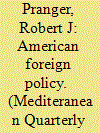

|
|
|
|
|
| Publication |
2009.
|
| Summary/Abstract |
A new American president will now confront the extraordinary complexity of his country's foreign policy. Presidents, even without foreign affairs backgrounds, have already formed ideas about basic directions that the nation's international policies should take, and it is these fundamental inclinations to which this essay addresses itself, an essay divided into four parts: (1) types of foreign policy, (2) some recent examples of presidential choices about direction, (3) future possibilities for a new administration that entered office in January 2009, and (4) limitations on the foreign policy choices of the new president-the old bugaboo of priorities.
|
|
|
|
|
|
|
|
|
|
|
|
|
|
|
|
| 2 |
ID:
087849
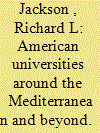

|
|
|
|
|
| Publication |
2009.
|
| Summary/Abstract |
The inauguration of President Barack Obama offers a historic opportunity to reshape America's interface with the world at large and to undo errors of commission, omission, and neglect of the past decade. US assets undervalued and underused in recent years will be rediscovered, including the network of accredited American colleges and universities around the globe: the Association of American International Colleges and Universities. This essay outlines the potential role of these institutions in shaping how the United States is seen in critical areas of the world and in serving as a beacon of American, private, nonprofit higher education. It also contains specific recommendations for how the Obama administration can strengthen, at minimal cost, the network of American institutions abroad without co-opting or using them as vehicles for US propaganda.
|
|
|
|
|
|
|
|
|
|
|
|
|
|
|
|
| 3 |
ID:
087847
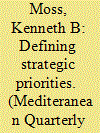

|
|
|
|
|
| Publication |
2009.
|
| Summary/Abstract |
The planned deployment of ballistic missile defense systems in Poland and a radar system in the Czech Republic to defend against possible attack from Iran has stirred strong opposition from Moscow. Concern about Iran's nuclear-enrichment program is legitimate, but the United States must address this issue by reconciling global objectives with regional tensions in the Middle East. If a negotiated solution is found, US policy must consider the reasons behind Iran's program, the dangers of proliferation of nuclear capabilities throughout the Middle East, and the strategic objectives the United States seeks with Russia, China, and Europe.
|
|
|
|
|
|
|
|
|
|
|
|
|
|
|
|
| 4 |
ID:
087851
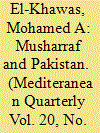

|
|
|
|
|
| Publication |
2009.
|
| Summary/Abstract |
Following a 1999 coup, Pakistan's General Pervez Musharraf ruled by decree with the support of the military. He held a presidential referendum and got his party elected. He amended the constitution to legitimize his military rule. His involvement in the war on terrorism led to the rise of religious extremism, and he persuaded the United States to propose a power-sharing plan. In 2007, Musharraf got himself re-elected by the outgoing parliament, an election subsequently challenged in court. In November, he declared a state of emergency and dismissed Supreme Court justices whom he feared would rule against him. Under external pressure, he ended the emergency after he had secured the presidency and resigned from the military. In 2008, opposition parties won the parliamentary elections and formed a coalition government. They have not yet reinstated the dismissed judges. They forced Musharraf to resign, but more steps are needed to complete the transition to a true democracy.
|
|
|
|
|
|
|
|
|
|
|
|
|
|
|
|
| 5 |
ID:
087848
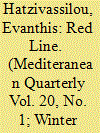

|
|
|
|
|
| Publication |
2009.
|
| Summary/Abstract |
The negotiating position of an international player is strengthened when it can persuade third parties that it has reached the limits of its concessions. However, from 1945 to 2004 the Greek side (both Athens and Nicosia) managed convincingly to convey this message to the international community only twice: in 1958, prior to the conclusion of the agreements for Cypriot independence, and in 2004, when the Annan Plan was rejected by the Greek-Cypriot community. This failure of the Greek side should be attributed to a combination of maximalism, lack of accurate assessments of the interests and objectives of other actors, and lack of consistency in Greek discourse.
|
|
|
|
|
|
|
|
|
|
|
|
|
|
|
|
| 6 |
ID:
087852


|
|
|
|
|
| Publication |
2009.
|
| Summary/Abstract |
Located at the southernmost tip of Europe, just off the coast of Africa, Malta has during recent years increasingly come into the international spotlight as a frontline state for irregular migration from Africa toward the European Union. Even though, in absolute terms, the number of seaborne migrants landing on the island has been rather modest, given the country's small size and very high population density, illegal immigration has become one of Malta's top policy priorities, nationally as well as on the EU level, and it has been calling for more support and burden-sharing mechanisms from other EU countries. This essay offers a broad overview of the migration issue as it has been unfolding in Malta during recent years, ranging from the main trends in irregular immigration, asylum issues, and the country's strict and contested detention policy to integration issues and the growth in anti-immigrant movements in Malta.
|
|
|
|
|
|
|
|
|
|
|
|
|
|
|
|
| 7 |
ID:
087850


|
|
|
|
|
| Publication |
2009.
|
| Summary/Abstract |
The Ecumenical Patriarchate is considered first among equals of all the Orthodox churches and presides over 200 million Christians. The ecumenical mission of the patriarchate is seriously contested by the official stance of the Turkish government and by ultranationalists who fear that the patriarchate might gain extraterritorial privileges and become a Vatican. At present, the Ecumenical Patriarchate is an institution with a global reach, but one that lacks a legal personality. The essay presents the two contrasting perspectives regarding the ecumenical status of the patriarchate and documents how the sources of the patriarchate's soft power marshal support in favor of its ecumenical mission
|
|
|
|
|
|
|
|
|
|
|
|
|
|
|
|
| 8 |
ID:
087846


|
|
|
|
|
| Publication |
2009.
|
| Summary/Abstract |
For the past decade, the United States has been promoting national transformation in the Balkans. In pushing the independence of Kosovo, Washington policy makers apparently believed that Serbia would acquiesce, most nations would recognize the newest independent state, and Russia would accept America's decision. None of these assumptions came to pass. Unfortunately, the war in the Caucasus was an inadvertent consequence of US policy in the Balkans. The West acted contrary to international law, violated the sovereignty of another state, and carelessly sacrificed the interests of neighboring states. The point is not that Russia acted correctly or legitimately in Georgia but that American policy makers must learn that actions have consequences, even actions by the US government. They need look no further than from Kosovo to Georgia.
|
|
|
|
|
|
|
|
|
|
|
|
|
|
|
|
|
|
|
|
|